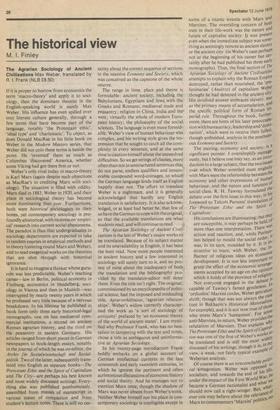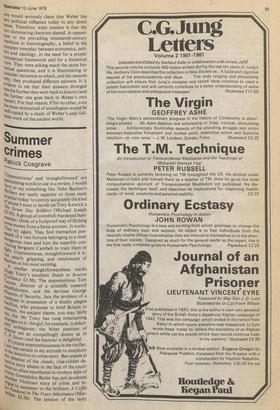The historical view
M. I. Finley
The Agrarian Sociology of Ancient Civilisations Max Weber, translated by R. I. Frank (NLB £8.50)
If it is proper to borrow from economics the term 'macro-theory' and apply it to sociology, then the dominant theorist in the English-speaking world is surely Max Weber. His influence has even spilled over into literate culture generally, through a few terms that have become part of the language, notably 'the Protestant ethic', 'ideal type' and 'charismatic'. To object, as does Donald MacRae in his little book on Weber in the Modern Masters series, that Weber did not coin these terms is beside the point. He 'invented' them as much as Columbus 'discovered' America, whether some Viking had got there first or not.
Weber's only rival today in macro-theory is Karl Marx (again despite such objections as MacRae's to crediting Marx with sociology). The situation is filled with oddity. Marx died in 1883, Weber in 1920, and their place in sociological theory has become more dominating than ever. Furthermore, both were historical sociologists to their bones, yet contemporary sociology is profoundly ahistorical, with itsstress on 'empirical' research into current social phenomena. The paradox is thus that undergraduates in sociology departments are expected to take in tandem courses in empirical methods and in theory (centring round Marx and Weber), and to read exegetical works on the theorists that are shot through with historical ignorance.
It is hard to imagine a thinker whose gururole was less predictable. Weber's teaching career—law in Berlin, political economy in Freiburg, economics in Heidelberg, sociology in Vienna and then in Munich—was interrupted by nearly twenty years in which he professed very little because of a nervous breakdown. In his lifetime he published in book form only three early historical-legal monographs, one on late mediaeval com mercial institutions, a second on ancient Roman agrarian history, and the third on the peasantry in eastern Germany. His articles ranged from short pieces in German newspapers to book-length essays, notably in the journal of which he was co-editor, the
Arch iv .fiir Sozialwissenschaft und Sozial politik. Two of the latter, subsequently translated into English as separate books—The
Protestant Ethic and the Spirit of Capitalism
and The City—are perhaps his best known and most widely discussed writings. Every thing else was published posthumously, assembled from masses of manuscript in various states of completion and from student's lecture notes. There is still no cer tainty about the correct sequence of sections in the massive Economy and Society, which was conceived as the capstone of the whole oeuvre.
The range in time, place and theme is formidable: ancient society, including the Babylonians, Egyptians and Jews with the Greeks and Romans; mediaeval trade and peasantry; religion in China, India and the west ; virtually the whole of modern European history; the philosophy of the social sciences. The language is even more formidable. Weber's view of human behaviour Was complex, and his writing style gives the impression that he sought to catch all the complexity in every sentence, and at the same time to caution himself about the unresolved difficulties. So we get strings of clauses, more often than not in unstructured sentences that do not parse, endless qualifiers and innumerable compound word-coinages, to which the German language lends itself as English happily does not. The effort to translate Weber is a nightmare, and it is generally acknowledged that hardly any English translation is satisfactory. It is also acknowledged, or at least had better be, that few of us have the German to cope with the original, so that the available translations are what students read, and will continue to read.
The Agrarian Sociology of Ancient Civilisations is the last of Weber's major works to be translated. Because of its subject matter and its unavailability in English, it has been the least read. Now more people interested in ancient history and a few interested in sociology will surely turn to it, and no protest of mine about the inadequacy of both the translation and the bibliography provided by the translator-editor will deter them. Even the title isn't right. The original, commissioned by an encyclopaedia of political science, had the imposed and misleading title, Agrarverhiiltnisse, 'agrarian relationships'. Weber's widow correctly characterised the work as 'a sort of sociology of antiquity' prefaced by 'an economic theory of the world of ancient states'. I am mystified why Professor Frank, who has no hesitation in tampering with the text and notes, chose a title as ambiguous and uninformative as Agrarian Sociology.
In his twenty-page introduction Frank boldly embarks on a global account of German intellectual currents in the late nineteenth and early twentieth centuries, in which he ignores the pertinent and often acrimonious discussions of economic history and social theory. And he manages not to mention Marx once, though the shadow of Marx was never absent from Weber's work. Neither Weber himself nor his place in contemporary sociology is intelligible except in
terms of a titanic wrestle with Marx and Marxism. The overriding concern of both men in their life-work was the nature and future of capitalist society. It was present even when the immediate subject was something as seemingly remote as ancient slavery or the ancient city (in Weber's case perhaps not at the beginning of his career but certainly after he had published his three earlY monographs). Thus, the final section of The Agrarian Sociology of Ancient Civilisations attempts to explain why the Roman Empire destroyed, rather than nourished, the 'preliminaries' (Ansiitze) of capitalism Weber thought he had detected in the ancient city. His involved answer embraces slavery, war , as the primary means of accumulation, and the specific political form of Roman int' penal rule. Throughout the book, further' more, there are hints of his later preoccuPat ion with bureaucracy, leadershi p and 'do nation', which were to receive their fullest. though unfinished, analysis in the posthunl' ous Economy and Society. The pairing, economy and society, is 3 significant pointer. I oversimplify outrageously, but I believe one may say, as an introduction to a large subject, that the two issues over which Weber wrestled most might with Marx were the relationship between the economy and other expressions of human behaviour, and the nature and function of social class. R. H. Tawney formulated the debate over the first issue in this way, in his( foreword to Talcott Parsons' translation or The Protestant Ethic and the Spirit 01 Capitalism: His conclusions are illuminating; but they are susceptible, it may perhaps be held, 01 more than one interpretation. There was action and reaction, and, while Puritan.' ism helped to mould the social order, it was, in its turn, moulded by it. It is in" structive to trace, with Weber, the ir.1fluence of religious ideas on econonlic development. It is not less important to grasp the effect of the economic arrangements accepted by an age on the which it holds of the province of religiop.' Not everyone engaged in the debate is capable of Tawney's famed gentleness. Int 'orthodox' Marxist circles, Weber gets shore shrift, though that was not always the cas (not in Bukharin's Historical Materialistn_, for example), and it is not now true of thosee who stress Marx's 'humanism'. For SOIL anti-Marxists, in return, Weber provides t,_°` refutation of Marxism. That explains WI The Protestant Ethic and the Spirit of CaPitats: ism was one of the first of Weber's works be translated and is still the most WicielY, discussed of his writings, though it is. M11/7,,
c c view, a weak, not fairly typical exarrIPI Weberian analysis.
Of course there is an irreconcilable po to cal antagonism. Weber was oPPosed life. socialism, and towards the end of his under the impact of the First World War, became a German nationalist and What ; should now call a right-winger. But, wh of ' ever one may believe about the relevatice Marx to contemporary 'Marxist' politics. 0' °ne would seriously claim that Weber has any political influence today in any direct sense. Therefore, what matters is that the tWo dominating theorists shared, in opposition to the prevailing nineteenth-century tradition in historiography, a belief in the enMplex interplay between economics, polities and ideology, in the need for a proper eOneeptual framework and for a historical view. They were asking much the same historical questions, and it is illuminating to consider the extent to which, and the reasons why, they produced different answers. Itis e,vident to me that their answers diverged less the further they went back in history (and the further one goes back in Weber's own ekareer). For that reason, if for no other, even Lie most ahistorical of sociologists would be well repaid by a study of Weber's only full ale work on the ancient world.



































 Previous page
Previous page